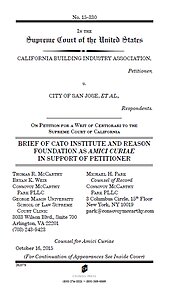California Building Industry Association v. San Jose
Learn more about Cato’s Amicus Briefs Program.
A San Jose ordinance requires developers to set aside 15 percent of their units for sale at an “affordable housing cost.” Those affordability restrictions remain in effect for 45–55 years. If developers don’t want to set aside affordable housing units, they have the option to build affordable units elsewhere, pay a fine, dedicate land for affordable units, or acquire or rehabilitate existing affordable units. However laudable it is to construct affordable housing, the city is essentially appropriating part of the developers’ property for its own uses or conditioning the issuance of permits on paying out large amounts of money. The California Building Industry Association (CBIA) filed suit, arguing that the city’s restrictions violate the Fifth Amendment’s Takings Clause, which prohibits the government from taking private property for public use without just compensation. Previous Supreme Court decisions, including Koontz v. St. Johns River Water Management District from 2013 (which Cato also supported), held that such conditions on building permits can violate the Takings Clause if the exaction—whether a fine or a requirement to set aside affordable housing—is unrelated to the proposed building project. It would thus be unconstitutional to condition a permit for a housing development on the construction of a new library, because the library has nothing to do with the proposed building project. In the CBIA case, however, the California Supreme Court ruled that, because the conditions in San Jose derive from a legislative ordinance rather than an ad hoc permitting condition, the U.S. Supreme Court’s clear precedents don’t fully apply. The CBIA has asked the U.S. Supreme Court to set the California Supreme Court straight by making clear that the Takings Clause prohibits such permitting conditions whether they come from a legislature or a discretionary permitting process. Cato, joined by the Reason Foundation, has filed a brief in support of the CBIA’s petition. We argue that there’s no basis in the Takings Clause for distinguishing between legislative conditions and ad hoc permitting conditions. To the landowner or the developer, the effect is the same: the government imposes onerous conditions before allowing them to use their land. Moreover, legislatively imposed conditions are worse because they have broader effects, thus magnifying the unconstitutional harms to property owners. Finally, there’s no reason to expect less abuse from the legislature than from permitting officials. Legislatures are prone to being captured by special interests who demand all sort of exactions from and conditions on landowners. Government officials, whether they are legislators or permitting clerks, often see taking property without compensation as a way to get something for nothing. The Supreme Court should take this case to say that this ain’t okay, San Jose.

This work is licensed under a Creative Commons Attribution-NonCommercial-ShareAlike 4.0 International License.
